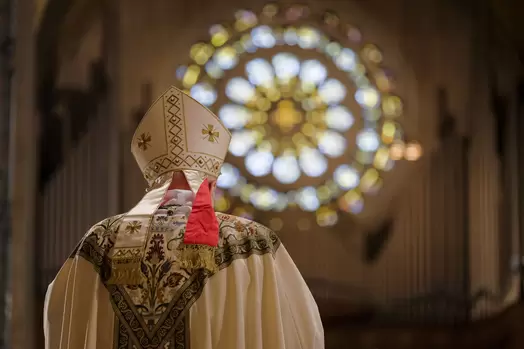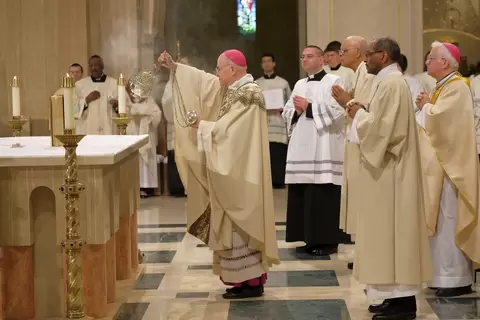Archbishop Who Called on Pope to Resign Now Living in Self-imposed Exile
By Stefano Pitrelli and Chico Harlan
Rome - In the instant he became one of the most controversial figures in modern Catholic Church history, Archbishop Carlo Maria Vigano went dark. The retired Vatican ambassador to Washington wrote a bombshell letter last summer calling on Pope Francis to resign on the grounds that he had tolerated a known sexual abuser. As that letter was published, Vigano turned off his phone, told friends he was disappearing, and let the church sort through the fallout. Nine months later, in his first extended interview since that moment, Vigano refused to disclose his location or say much about his self-imposed exile. But his comments indicate that, even in hiding, he is maintaining his role as the fiercest critic of the Francis era, acting either as an honourable rebel or, as his critics see it, as an ideological warrior attacking a pope he doesn't like. Vigano corresponded by email with The Washington Post over two months, writing 8,000 words in response to nearly 40 questions. He was blistering in his criticism of Francis, saying "it is immensely sad" that the pope was "blatantly lying to the whole world to cover up his wicked deeds." The Vatican has had little official response to Vigano. A communications official declined to comment for this story. But Francis last month responded for the first time to Vigano's summer letter. The pope said he knew "nothing, obviously, nothing" about the misconduct of former cardinal Theodore McCarrick and could not remember if he had been personally warned about McCarrick by Vigano in 2013. Vigano claimed to have told Francis that McCarrick had "corrupted generations of seminarians and priests." "How could anybody, especially a pope, forget this?" Vigano wrote to The Post. McCarrick was defrocked in February after the case exploded into public view and he was found guilty in a Vatican proceeding for "sins" with minors and adults. In his correspondence with The Post, Vigano offered detailed thoughts about church affairs, but he resisted personal questions - and he declined requests to meet in person. Vigano wrote that he has become "more careful about whom I meet and what I say." He said questions about him were "irrelevant to the serious problems facing the Church." "My life is quite normal, thank you for asking," he wrote. Vigano wrote "n/a" in response to questions about where he was living, whether he believes his safety is under threat, and how his actions last August have otherwise altered his life. Vigano wrote that he has not been contacted by the Catholic Church since his accusations were initially published by several conservative church news outlets. He described himself as an "old man" who "will be appearing in front of the Good Judge before too long." Vigano, 78, was two years into his retirement when he came forward with his letter, a stunning break for a lifelong church representative who'd held major bureaucratic posts inside the Vatican and represented the Holy See in several countries as a diplomat. "My silence would make me complicit with the abusers, and lead to yet more victims," he said. Although Vigano's letter focused on only McCarrick's case, it became a touchstone for a wider and fierce struggle over internal corruption, the role of homosexuality in abuse, and whether Francis is leading the church astray. Vigano wrote last year that both Benedict XVI and Francis had known about McCarrick's misconduct. But he portrayed Benedict as attempting to take quiet disciplinary action against the then-cardinal and Francis as patently ignoring those sanctions. Last month, private letters disclosed by a former McCarrick aide supported Vigano's claim that McCarrick was told by the Vatican to retreat from public life during Benedict's papacy. But it is also clear that McCarrick swiftly ignored his orders from Rome, even while Benedict remained pope. No documents have surfaced showing whether Francis knew of the sanctions against McCarrick by the time he became pope in 2013. Vigano said the "truth will eventually come out" for Francis, as it had for Cardinal Donald Wuerl, the former archbishop of Washington who portrayed himself last summer as being unaware about complaints against McCarrick - a claim that documents subsequently proved false. Vigano suggested to The Post that Francis is covering up other cases, "as he did for McCarrick." For Catholic traditionalists - a group that includes some bishops and cardinals, as well as pundits, journalists and everyday members of the faith - Vigano has become a revered symbol, though an absent one. "He's certainly acquired a very strong moral leadership in the Catholic world," said Virginia Coda Nunziante, president of Italy's March for Life committee. Vigano frequented conservative church conferences and antiabortion events before the release of his testimony; now, he is a no-show. He keeps in touch with people only on his own terms, calling them from a Skype account that does not resemble his own name. Many in the Catholic world feel that Vigano - long known for his hot temper and inner-Vatican rivalries - is neither credible nor interested in stopping sexual abuse. They note that documents show he tried to quash an investigation into a Minnesota archbishop accused of misconduct, an accusation Vigano denies. They also say his testimony last summer was a barely-veiled attack against homosexuals in the upper ranks, and that his real goal was to weaken Francis rather than help the church. "There is an element of Machiavellian exploitation" with Vigano, said Austen Ivereigh, a papal biographer. Even before his public criticism of Francis, Vigano was a figure of controversy. As ambassador to Washington, he took heat for arranging a meeting between Francis and Kim Davis, a county clerk who refused to issues marriage licenses to same-sex couples in Kentucky. He was recalled from the post in 2016, amid allegations he had become entangled in the American conservative marriage fight. Vigano was among the senior clerics to have received money from West Virginia bishop Michael J. Bransfield, accused in a mass corruption scandal revealed this month by The Post. Vigano said aides told him it would be an affront to decline the money, so he donated it to charity. Vigano, in his responses to The Post, made it clear he is watching even smaller moments inside the Vatican. He cited an exchange from a Vatican press conference in February in which a journalist asked Archbishop Charles Scicluna, a church abuse czar, about a case in Argentina. Scicluna began to answer, and the Vatican spokesman cut in, saying the press conference - held during a landmark abuse summit - was not a time to "focus on individual cases." Results of an investigation into the case would later be released, the spokesman assured.
"One may be forgiven for wondering whether the results of an honest and thorough investigation really will be released, and in a timely fashion," Vigano wrote. "There is a certain irony here: This exchange happened while [the summit organizers] were discussing what they themselves called transparency." As far as the McCarrick case, the Vatican pledged in October to conduct a "thorough" study of its archives and reveal what it finds about who knew what. The church has since said only that an investigation is ongoing. "The results of an honest investigation would be disastrous for the current papacy," Vigano wrote to The Post. He also acknowledged that such an investigation may harm the reputations of more traditionalist pontiffs, Benedict and John Paul II, who presided over McCarrick's rise. "But that is not a good reason for not seeking the truth," Vigano said. "Benedict XVI and John Paul II are human beings, and may well have made mistakes. If they did, we want to know about them. Why should they remain hidden? We can all learn from our mistakes." Vigano did not respond directly to a question about whether he has documents to back up his claims. "The time has not yet come for me to release anything," Vigano said, instead calling on the pope and other Vatican officials to release documentation, "assuming they have not yet destroyed it." Vigano also spoke in detail about one of his most contentious beliefs: that the sexual abuse crisis would be "far less severe" if the "problem of homosexuality in the priesthood were honestly acknowledged and properly addressed." The question of whether homosexuality has anything to do with abuse has divided the Vatican hierarchy. Studies show there is no correlation between sexual orientation and the likelihood to commit abuse. Francis has emphasized not homosexuality, but the vast power chasm that priests take advantage of when abusing younger victims. But people like Vigano raise the point that 80 percent of clerical abuse victims are male, and the majority of those are 14 and older. "Given the overwhelming evidence, it is mind-boggling that the word 'homosexuality' has not appeared once, in any of the recent official documents of the Holy See" on events dealing with abuse and youth, Vigano wrote. He said a "gay mafia" among bishops, intent on protecting themselves, was "sabotaging all efforts at reform." Vigano referenced only two regrets about his letter last summer. He said he wished he had spoken out sooner. He also said, "in retrospect," he would have softened the call for Pope Francis to resign - a demand even Vigano's supporters said was far-fetched and distracting. Vigano now leaves open the possibility that Francis could repent, and says the pope should step down "if he refuses to admit his mistakes and ask for forgiveness." Washington Post
|
.
Any original material on these pages is copyright © BishopAccountability.org 2004. Reproduce freely with attribution.

